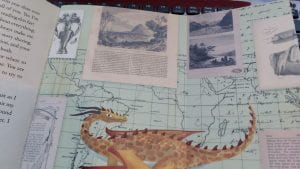This is the latest book from yet another fantastic graduate of the Bath Spa course on Writing for Young People. It is Jasbinder Bilan’s 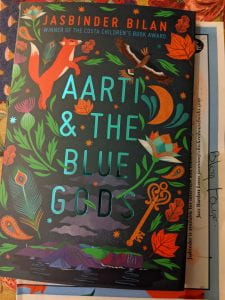 third book and this time she takes us to a remote Scottish Island, which is hiding a secret. Aarti has lived on the island for most of her life and can remember little else. She is looked after by her ‘Aunt’ and life is extremely hard. they are totally self sufficient, living off the vegetables they grow, the eggs from their hens and anything they can find on the island; the only friend that Aarti has is a fox that she calls Chand, although she doesn’t know where the name comes from.. However, as she grows older, Aarti begins to wonder if she is being told the truth about what happened to her parents and whether they are really dead. There is also the mystery of a locked room that she is not allowed to enter, but when it is left unlocked one day, she goes in and discovers an old stuffed toy that brings back some long-lost memories. One of the few things that Aarti has is a collection of stories about Hindu deities, hence the reference in the title to blue Gods; although why she has this is a mystery.
third book and this time she takes us to a remote Scottish Island, which is hiding a secret. Aarti has lived on the island for most of her life and can remember little else. She is looked after by her ‘Aunt’ and life is extremely hard. they are totally self sufficient, living off the vegetables they grow, the eggs from their hens and anything they can find on the island; the only friend that Aarti has is a fox that she calls Chand, although she doesn’t know where the name comes from.. However, as she grows older, Aarti begins to wonder if she is being told the truth about what happened to her parents and whether they are really dead. There is also the mystery of a locked room that she is not allowed to enter, but when it is left unlocked one day, she goes in and discovers an old stuffed toy that brings back some long-lost memories. One of the few things that Aarti has is a collection of stories about Hindu deities, hence the reference in the title to blue Gods; although why she has this is a mystery.
Unfortunately life takes a horrendous turn, when Aunt is killed as she tries to collect some sea bird eggs from the cliffs and Aarti is left totally on her own. To begin with she thinks she can manage, but then her supplies are ruined by rain and she realizes that a young girl cannot live by herself. Just as she is beginning to give up all hope, she finds a young boy floating in the sea and manages to save him. Euan is a young Scottish boy and talks to Aarti about his family and whether they will be able to leave the island and get back to more inhabited land. This raises the question of whether there is a boat on the island. Aarti has never seen one, but they realize that Auntie would have needed some means to get her and Aarti to the island in the first place. After lots of exploration they are finally successful in finding a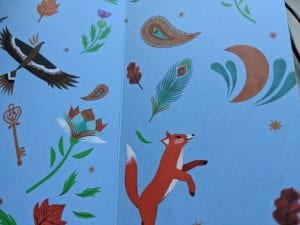 small boat hidden away in a cave and eventually manage to bring it around to the small harbour. The pair manage to escape from the island and head in what they think is the general direction of other islands and the mainland. Thankfully the boat is rescued during a storm and the youngsters saved; however, that is when things take a very strange turn, because Euan is nowhere to be found and none of the rescuers had seen him on the boat. What happens next totally changes Aarti’s life and helps explain so much of her past, but it is her discoveries about Euan that will probably have the most profound impact on her future.
small boat hidden away in a cave and eventually manage to bring it around to the small harbour. The pair manage to escape from the island and head in what they think is the general direction of other islands and the mainland. Thankfully the boat is rescued during a storm and the youngsters saved; however, that is when things take a very strange turn, because Euan is nowhere to be found and none of the rescuers had seen him on the boat. What happens next totally changes Aarti’s life and helps explain so much of her past, but it is her discoveries about Euan that will probably have the most profound impact on her future.
This is one of those books that keeps growing in its impact on the reader. When you start thinking of the stresses of living in that environment and then the questions about family and lack of communication, it really does make you understand just how bleak the whole way of life would be. This is definitely a five star read, for a whole host of reasons and I have become a great fan of Jasbinder’s work. we also have a fabulous cover and inside which draws together the two mythologies that are represented in the book. Hopefully it will encourage the young readers to explore these and see how different cultures share connections.

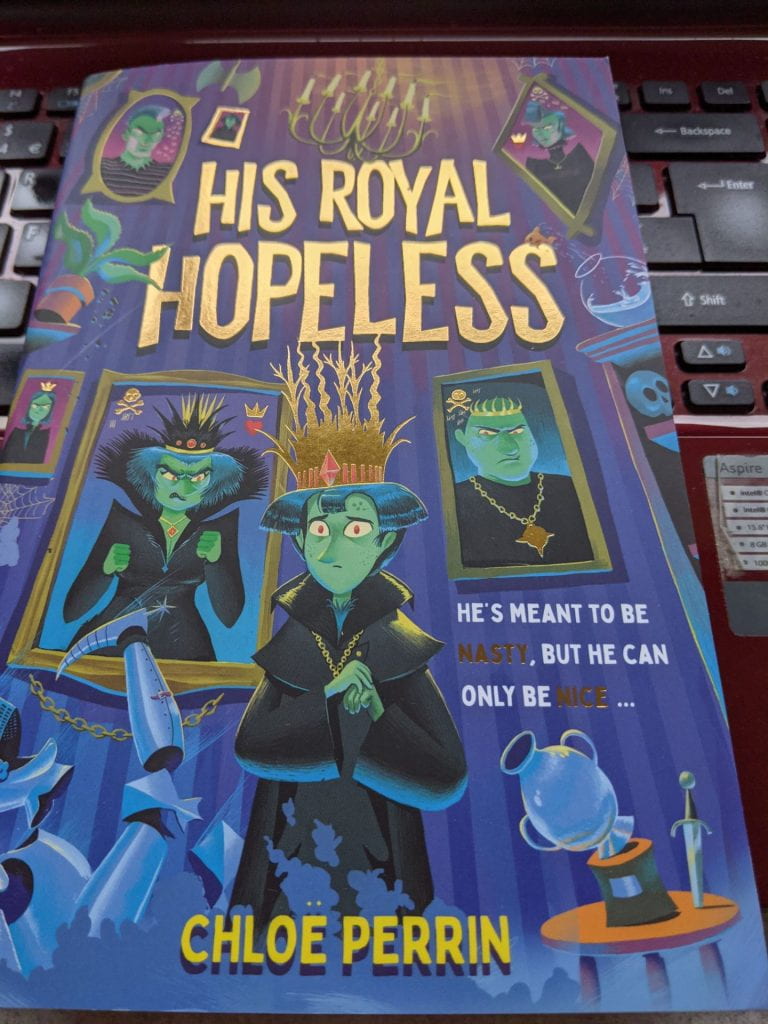 happening. Young Robbie is the heir to the Sinistevil’s dynasty and whilst he tries very hard to live up to his mother’s expectations, it is obvious that he will never fit (both literally and metaphorically), into his dead brother Brutus’s shoes. The family are the most evil rulers that you can imagine, with a love of killing, looting and pillaging. At the age of 12 years they are made to pledge their heart to a jewelled sceptre, which re-enforces their desire for evil. Nothing gets in their way and there is no such thing as family love or loyalty. The problem is that Robbie really does not fit into this world. He thinks he is evil, but in fact he is a real softy and even has a local peasant girl, Layla, as his friend. When Robbie discovers that he has an artificial heart, after his mother had the real one removed when he was a baby, he decides to go and retrieve the real one, so that he can take the oath to the sceptre. What follows is a funny and yet sad look at someone who is desperate for love and affection, but who cannot see the reality of the family that he is growing up in. Thankfully there are people who want to help Robbie be the good person he is meant to be, although they have their own challenges in life.
happening. Young Robbie is the heir to the Sinistevil’s dynasty and whilst he tries very hard to live up to his mother’s expectations, it is obvious that he will never fit (both literally and metaphorically), into his dead brother Brutus’s shoes. The family are the most evil rulers that you can imagine, with a love of killing, looting and pillaging. At the age of 12 years they are made to pledge their heart to a jewelled sceptre, which re-enforces their desire for evil. Nothing gets in their way and there is no such thing as family love or loyalty. The problem is that Robbie really does not fit into this world. He thinks he is evil, but in fact he is a real softy and even has a local peasant girl, Layla, as his friend. When Robbie discovers that he has an artificial heart, after his mother had the real one removed when he was a baby, he decides to go and retrieve the real one, so that he can take the oath to the sceptre. What follows is a funny and yet sad look at someone who is desperate for love and affection, but who cannot see the reality of the family that he is growing up in. Thankfully there are people who want to help Robbie be the good person he is meant to be, although they have their own challenges in life.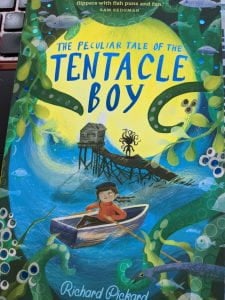 I know that I am biased about this, because they are based in my part of the world, but anything published by the fabulous Chicken House is going to get my attention. This title was even more noteworthy because it was the inaugural Chairman’s Choice prize winner at the 2019 Times/Chicken House competition. Added to this is the totally original concept that we find in this heartwarming story, it is a real must-read for this summer.
I know that I am biased about this, because they are based in my part of the world, but anything published by the fabulous Chicken House is going to get my attention. This title was even more noteworthy because it was the inaugural Chairman’s Choice prize winner at the 2019 Times/Chicken House competition. Added to this is the totally original concept that we find in this heartwarming story, it is a real must-read for this summer. world, there is a small path that punches a shapely hole through a thick wall of hedging… This is the doorway to Alum Chine – a steep-sided valley that guides you down through the cliffs and toward a Bournemouth beach hut, where much of The Peculiar Tale of the Tentacle Boy was written.
world, there is a small path that punches a shapely hole through a thick wall of hedging… This is the doorway to Alum Chine – a steep-sided valley that guides you down through the cliffs and toward a Bournemouth beach hut, where much of The Peculiar Tale of the Tentacle Boy was written. your nose as a canopy of trees obscures the sunlight. Further along the pathway, a black iron fence shielding its steepest edge, a weathered bridge comes into view – the teal green paint flaking as it stretches across the deepest section of woodland. We call this ‘Summer’s Bridge’, a place to remember my dad’s beautiful border collie who was possibly the only being to love Alum Chine quite as much me.
your nose as a canopy of trees obscures the sunlight. Further along the pathway, a black iron fence shielding its steepest edge, a weathered bridge comes into view – the teal green paint flaking as it stretches across the deepest section of woodland. We call this ‘Summer’s Bridge’, a place to remember my dad’s beautiful border collie who was possibly the only being to love Alum Chine quite as much me.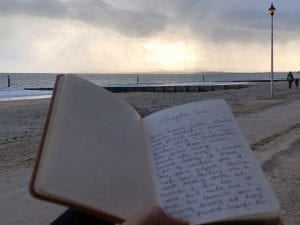 facing out onto the golden sand of Bournemouth’s prize-winning beach. Here I would sit, come rain or shine, in a squidgy deck chair with my leatherbound notebook from Portobello market and a thick mug of tea – which I’d brew on the small gas hob inside.
facing out onto the golden sand of Bournemouth’s prize-winning beach. Here I would sit, come rain or shine, in a squidgy deck chair with my leatherbound notebook from Portobello market and a thick mug of tea – which I’d brew on the small gas hob inside.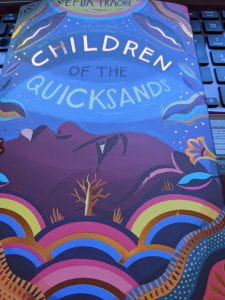

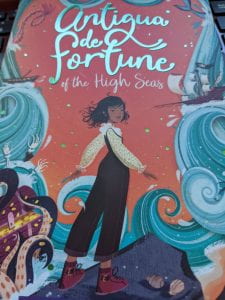 This is the second book about Pirates that I have had the pleasure of reading in the last few months. this one is aimed at a slightly older audience, age 8 years and above and definitely makes it onto the reading list for “Talk like a Pirate” day.
This is the second book about Pirates that I have had the pleasure of reading in the last few months. this one is aimed at a slightly older audience, age 8 years and above and definitely makes it onto the reading list for “Talk like a Pirate” day.
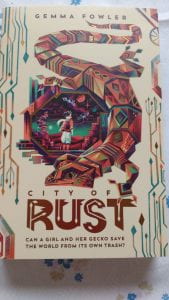



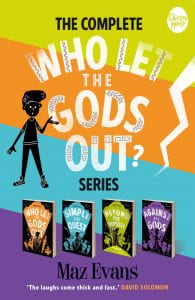 and extremely funny story. The author has been thrilling us with her first series “Who Let the Gods Out” and I am sure that I was not the only person suffering from withdrawal symptoms when that series finished. I need not have worried because she has come back with a complete ‘humdinger’ of a plot and a feisty and completely awesome heroine called Valentine Day (yes, really).
and extremely funny story. The author has been thrilling us with her first series “Who Let the Gods Out” and I am sure that I was not the only person suffering from withdrawal symptoms when that series finished. I need not have worried because she has come back with a complete ‘humdinger’ of a plot and a feisty and completely awesome heroine called Valentine Day (yes, really).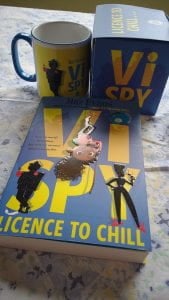 to stop them. the problem is how will she achieve this and who can she trust to help her. The world seems to be full of villains, recovering villains, spies and robowars aficionados. Vi also discovers that not only is her mum a retired spy but so is her grandmother and several generations before that; so it is no wonder that she has this need to investigate things. The plot moves at a tremendous pace and it really does need you to hang on to your hat as the action moves forward.
to stop them. the problem is how will she achieve this and who can she trust to help her. The world seems to be full of villains, recovering villains, spies and robowars aficionados. Vi also discovers that not only is her mum a retired spy but so is her grandmother and several generations before that; so it is no wonder that she has this need to investigate things. The plot moves at a tremendous pace and it really does need you to hang on to your hat as the action moves forward. WHALE and her children’s poetry has been published in Caterpillar magazine. Her career began as a TV journalist, writing for The Daily Telegraph and TV Times magazine and she still regularly broadcasts her views on anything from politics to parenthood on BBC Radio 2 and the bus.
WHALE and her children’s poetry has been published in Caterpillar magazine. Her career began as a TV journalist, writing for The Daily Telegraph and TV Times magazine and she still regularly broadcasts her views on anything from politics to parenthood on BBC Radio 2 and the bus.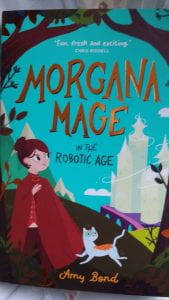 What a really great concept for a story. The heroine, Morgana is a witch and lives in a world that has divided into the magical community and the non-magic; the latter have become a highly technical society and robots are used in order to do all of the more menial tasks in life. The main problem is the absolute dislike that the two societies have for each other, it really is a case of “Ne’er the twain shall meet”. The only reason that the magical community visits the city is to get supplies from the small magical community, who live in the ‘undercity’ and are looked down on by the non-magic. Morgana is definitely different and has a fascination for robots; her magical abilities are nearly non-existent and she really wants to go to school. When her father takes her on one of his trip to the city she is delighted and together with her friend Esther she makes several secret visits to the metropolis. A turning point comes when school inspectors arrive in the village and she demands that she be allowed to attend school, something unheard of in the past. The consequences not only put her at odds with her community, but it also puts her life at risk, when she and her new friend Jonathan find that robots have been changed and are ready to take over the world.
What a really great concept for a story. The heroine, Morgana is a witch and lives in a world that has divided into the magical community and the non-magic; the latter have become a highly technical society and robots are used in order to do all of the more menial tasks in life. The main problem is the absolute dislike that the two societies have for each other, it really is a case of “Ne’er the twain shall meet”. The only reason that the magical community visits the city is to get supplies from the small magical community, who live in the ‘undercity’ and are looked down on by the non-magic. Morgana is definitely different and has a fascination for robots; her magical abilities are nearly non-existent and she really wants to go to school. When her father takes her on one of his trip to the city she is delighted and together with her friend Esther she makes several secret visits to the metropolis. A turning point comes when school inspectors arrive in the village and she demands that she be allowed to attend school, something unheard of in the past. The consequences not only put her at odds with her community, but it also puts her life at risk, when she and her new friend Jonathan find that robots have been changed and are ready to take over the world.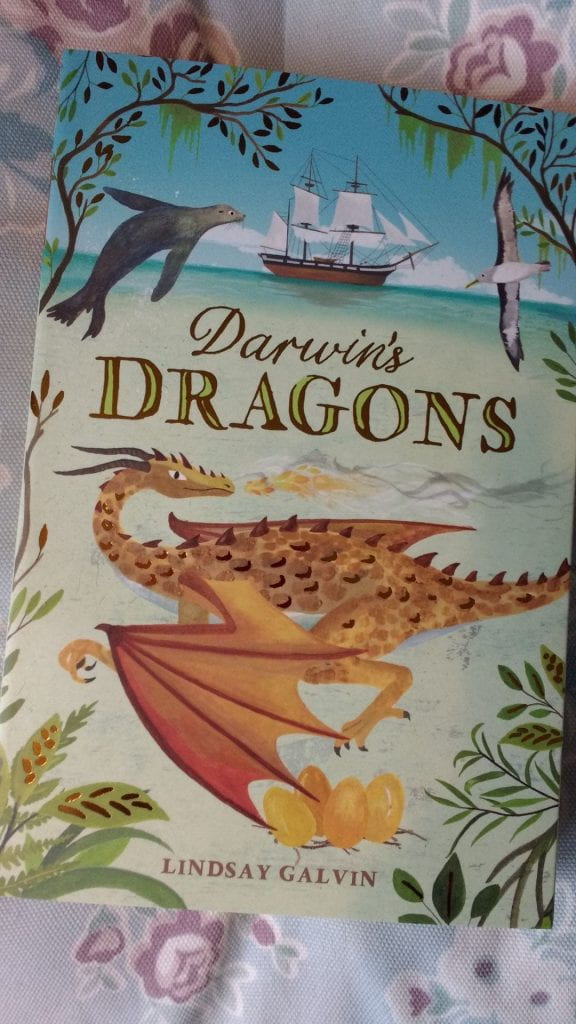 Since the bicentenary of his birth in 1809 there has been a great deal written about the naturalist Charles Darwin. Many of the books focus on his major work “On the Origin of Species”, or they are biographies which cover his whole life. this new book by Lindsay Galvin takes a slightly different tack and covers the period of his time on HMS Beagle from 1831-36. Darwin himself is not even the main character in the story, that honour goes to the young cabin boy Syms Covington, who in real life was promoted to become Darwin’s assistant during the five year voyage.
Since the bicentenary of his birth in 1809 there has been a great deal written about the naturalist Charles Darwin. Many of the books focus on his major work “On the Origin of Species”, or they are biographies which cover his whole life. this new book by Lindsay Galvin takes a slightly different tack and covers the period of his time on HMS Beagle from 1831-36. Darwin himself is not even the main character in the story, that honour goes to the young cabin boy Syms Covington, who in real life was promoted to become Darwin’s assistant during the five year voyage.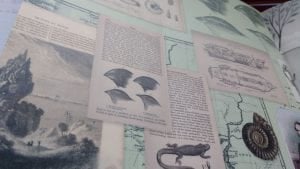 make us think about the way that we treat creatures. In the book, Darwin and other naturalists see the animals as subjects for experimentation and investigation. Whilst they are frustrated when something happens to the creatures, it is just an inconvenience and there is little sense that they have any empathy for the animals they have captured. Luckily Darwin seems to have altered his views somewhat as he grew older and Lindsay Galvin has quoted him as saying “All animals feel wonder and may exhibit curiosity” and also “There is no fundamental difference between man and animals in their ability to feel pleasure and pain, happiness and misery”, both taken from “The Descent of Man” . This story can be read at several different levels and I particularly like all the information at the back of the book, which will encourage young people to read more about the period and the discoveries that were being made. the discussion with the author gives a brilliant insight into how she created the book and what caught her interest at the very beginning. The illustrations are a lovely addition and blend extremely well, but it is the actual cover and the inside covers which are a real ‘Tour de Force’; they are absolutely stunning and make this a very special addition to anyone’s bookshelf.
make us think about the way that we treat creatures. In the book, Darwin and other naturalists see the animals as subjects for experimentation and investigation. Whilst they are frustrated when something happens to the creatures, it is just an inconvenience and there is little sense that they have any empathy for the animals they have captured. Luckily Darwin seems to have altered his views somewhat as he grew older and Lindsay Galvin has quoted him as saying “All animals feel wonder and may exhibit curiosity” and also “There is no fundamental difference between man and animals in their ability to feel pleasure and pain, happiness and misery”, both taken from “The Descent of Man” . This story can be read at several different levels and I particularly like all the information at the back of the book, which will encourage young people to read more about the period and the discoveries that were being made. the discussion with the author gives a brilliant insight into how she created the book and what caught her interest at the very beginning. The illustrations are a lovely addition and blend extremely well, but it is the actual cover and the inside covers which are a real ‘Tour de Force’; they are absolutely stunning and make this a very special addition to anyone’s bookshelf.